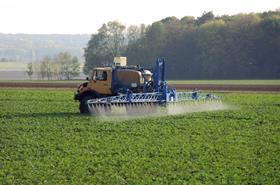
The Ellen MacArthur Foundation has criticised modern food production as being a major obstacle to healthy eating, calling for a “major redesign” of the food system.
The charity, founded by sailing legend Ellen MacArthur, who broke the record for fastest solo voyage around the world in 2005, listed air pollution, water contamination, pesticide exposure and excessive antibiotic use as making healthy eating impossible for people around the world.
The report states that for every dollar spent on food, society pays two dollars in health, environmental and economic costs. They estimate that around $5.7 trillion of those costs are due to the way food is produce
They estimated by 2050, five million people per year could die due to industrial production factors – twice the current number of people killed by obesity, and four times the number people killed in road traffic crashes globally.
The charity launched its new Cities and Circular Economy for Food report yesterday, calling on leaders to adopt circular economy principles, where food is grown locally and in a way that regenerated natural resources.
MacArthur said: “The way we produce food today is not only extremely wasteful and damaging to the environment, it is causing serious health problems. It cannot continue in the long term. We urgently need to redesign the system. People around the world need food that is nutritious, and that is grown, produced and delivered in a way that benefits their health, the environment and the economy.”
The report found that eliminating waste and improving health through the circular economy could be worth $2.7 trillion a year to the global economy. It urged cities to take the lead in sparking a transformation, with 80 per cent of all food expected to be consumed in cities by 2050.
The report states: “Currently, the agrifood industry is responsible for almost a quarter of greenhouse gas emissions globally, degrades the natural resources on which it depends, and pollutes air, water, and soil. The equivalent of six garbage trucks of edible food is lost or wasted every second. In cities, less than 2 per cent of the valuable biological nutrients in food by-products and organic waste (excluding manure) is composted or otherwise valorised.
“Perhaps most surprisingly, even when apparently making healthy food choices, people’s health is still being harmed by the way we produce food and deal with its by-products.
“Among the harmful impacts of such methods are diseases caused by air pollution and water contamination, health consequences of pesticide use, and increased antimicrobial resistance. Some of the principal causes are overuse of fertilisers, excessive reliance on antibiotics in animals, and untreated human waste.”






No comments yet